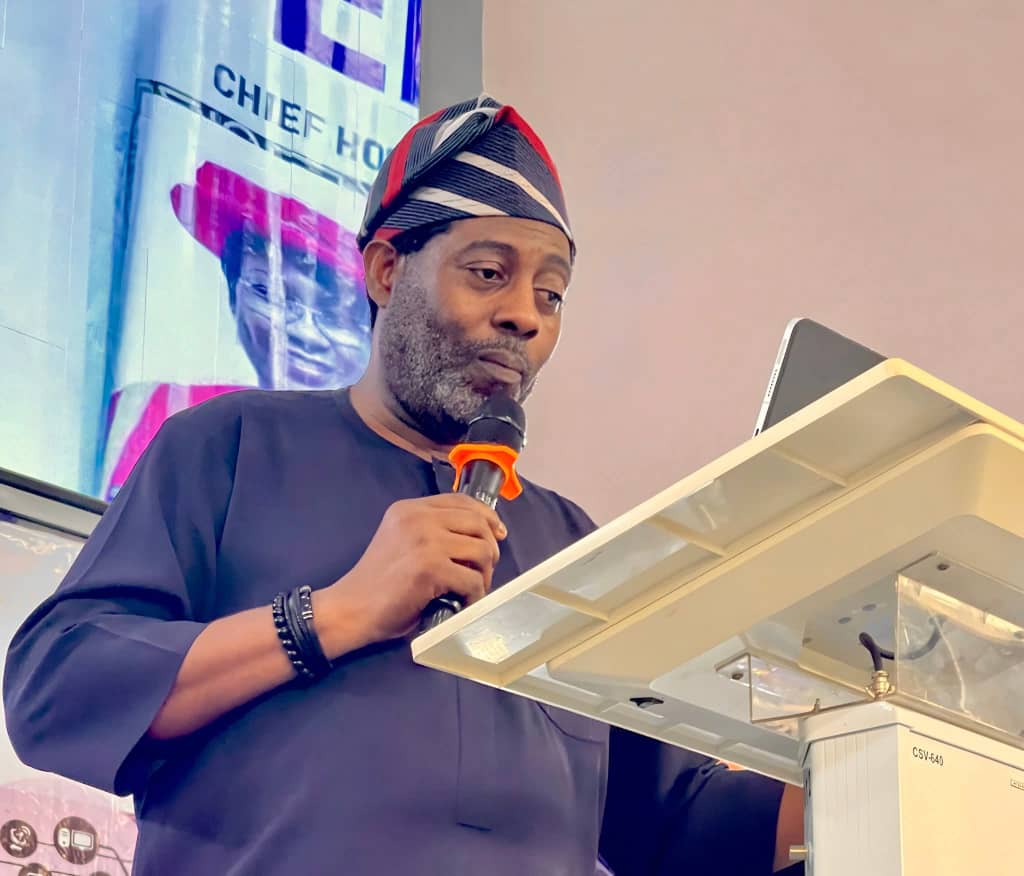Reimagining the Stage: Culture, Code and Connection in the Age of Digital Convergence

By Femi Odugbami
DISTINGUISHED scholars, theatre practitioners, creators, students, and lovers of the performing arts, I am deeply honoured to stand before you today, not only as a storyteller and media executive, but as a cultural descendant of a remarkable literary tradition. I come from the family of D.O. Fagunwa, the legendary Yoruba novelist whose richly imaginative works such as Ogboju Ode Ninu Igbo Irunmale (The Forest of a Thousand Demons) have shaped Nigerian literature and theatre for generations.
For over 40 years, Fagunwa’s fantastical worlds have leapt from page to stage, dramatized in Yoruba and English, adapted by masterful directors, and performed across Nigeria and beyond. His stories were always ahead of their time, richly layered, morally complex, and populated with magical beings, spiritual quests, and cultural wisdom.
But today, as we gather to reflect on Technology, Intercultural Dialogue, and the Future of the Performing Arts, I ask us to imagine: What might become possible when such mythic narratives meet the tools of artificial intelligence, virtual reality, motion capture, and immersive theatre? Could we one day walk through the forests of Fagunwa in a virtual experience — encountering Aroni with one hand, witnessing Akara-ogun’s battles, and dialoguing with the unseen spirits — not just as audience members, but as participants?
Could AI allow us to simulate indigenous languages in real time, offering dynamic subtitling or linguistic immersion to audiences across cultures?
Could such technology help us archive, revive, and re-interpret ancient cosmologies that are at risk of fading into obscurity?
These are the kinds of questions that excite me — not just as a descendant of Fagunwa’s legacy, but as an advocate for what lies ahead for African storytelling when it fully embraces the digital stage.
The Digital Turn: Beyond Technique, Toward Transformation
IN the 20th century, performance was rooted in presence — in immediacy, sweat, song, silence. Theatres were physical. The audience sat still. The drama unfolded in real time. Technology was helpful, but peripheral. Today, the landscape is radically different. Performance is now fluid. The stage is both physical and digital. The audience scrolls, shares, and sometimes interacts from thousands of miles away. We stream plays on YouTube. We film spoken-word poetry with drones. We dance to sounds generated by AI.
But let me be clear: This is not the death of the performing arts — it is their rebirth. The digital turn is not merely about using new gadgets. It is about rethinking performance itself — expanding its reach, reimagining its aesthetics, and inviting new modes of engagement.

Femi Odugbemi
Fagunwa’s The Forest of a Thousand Demons, for example, need not only be restaged on wooden floorboards. In this era, it can become a digitally immersive universe, complete with visual effects, interactive storytelling, and multi-sensory engagement. The mythic, magical world he envisioned — once limited to oral narration or the printed page — can now envelop global audiences in 3D environments or holographic installations. This is what excites me. Not just the modernization of our heritage, but its transformation.
Intercultural Dialogue: Preserving Roots, Expanding Reach
THE performing arts are no longer local experiences. Technology has turned culture into conversation. What was once oral, then textual, now becomes virtual. This creates space for intercultural dialogue that is immediate and multidirectional. A traditional Yoruba performance can now be watched, critiqued, and celebrated by artists in Tokyo or Toronto — not months later, but in real time. Yet this global exposure brings a crucial tension: How do we innovate without losing authenticity? How do we embrace plurality without succumbing to homogenization?
Here again, I return to Fagunwa. His work, deeply indigenous, offers a model of cultural specificity that is universally resonant. The characters, proverbs, and cosmologies may be Yoruba, but the moral dilemmas and human truths are global. His stories remind us that local stories told with truth, depth, and creativity can resonate across borders. And now, with the tools of AI, machine learning, and digital theatre, such works can be translated, subtitled, re-performed, re-contextualized — not to dilute their cultural identity, but to make their spirit travel further.
Intercultural dialogue is not about abandoning the roots. It’s about planting them in new soil.
The Future of the Performance Arts: A Call to Courage and Imagination
SO what does the future look like? It looks like a hybrid stage — where voice actors perform in Lagos, dancers perform in Berlin, and avatars perform in the cloud.
It looks like theatre curricula that teach stagecraft and storytelling for mobile screens.
It looks like AI-powered assistants helping a director sketch a virtual set, or a playwright generating multilingual versions of a script.
It looks like The Forest of a Thousand Demons performed in an interactive theatre dome, where audience members vote in real time to determine Akara-Ogun’s fate.
But beyond the glitter of technology, the future must still prioritize meaning. Emotion. Humanity. Theatre has always been the art of presence. As we embrace tech, we must not lose the touch. The intimacy. The moral mirror.
Technology and the Business of Theatre: Survival through Innovation
WE must be clear-eyed about the context in which African theatre exists today. The business of theatre in Nigeria — like many parts of Africa — is not thriving. It is surviving. We face a chronic lack of performance venues, irregular funding streams, underdeveloped touring circuits, and minimal institutional support. The average theatre production is a labour of love, not a viable commercial enterprise. But this is exactly where technology can be transformative — not just creatively, but economically.
First, digital platforms can expand our audience base far beyond the four walls of a theatre. A stage performance filmed with high production value can be streamed, sold, or licensed on digital platforms — from YouTube to Amazon Prime, to locally-owned streaming apps. A Lagos-based production could find viewership in Nairobi, Johannesburg, Atlanta, and London — with proper digital marketing and strategic partnerships.
Second, theatre companies can monetize digital assets. Scripts can become e-books. Costumes and props can be auctioned as NFTs. Behind-the-scenes footage can be repurposed into mini-documentaries. A single production can birth multiple revenue streams, if we begin to think digitally from the outset.
Third, audience development is no longer restricted by geography. With proper use of social media, email marketing, and AI-powered targeting tools, producers can cultivate niche communities across the diaspora who are eager for authentic African narratives. Crowdfunding platforms can support projects, especially when the audience feels included in the creative journey.
Fourth, immersive technologies can reduce physical overhead. With VR and AR, we don’t always need costly sets or venue rentals. A 360-degree virtual theatre can be designed once and used repeatedly — making it easier for emerging practitioners to experiment and showcase work at scale.
And fifth, data is now a critical currency. By using digital ticketing systems, online engagement tools, and analytics, theatre producers can better understand audience preferences, optimize marketing, and build lasting patronage networks. The informal, guesswork-driven approach to production and promotion is no longer sustainable.
Technology, then, is not merely a tool of aesthetic enhancement — it is a strategy for sustainability. In a hostile funding environment, technology can lower the cost of entry, expand access, and professionalize the business side of theatre. But only if we invest in training, infrastructure, and a mindset shift.
The future of African theatre will not only belong to the most talented dramatists — but to those who can blend cultural depth with digital strategy, artistic excellence with entrepreneurial thinking.
So what are critical next steps?
Modernize the Performing Arts Curriculum – We must bridge the worlds of heritage and innovation. Our students should study Fagunwa and AI. Egungun and AR. The griot and the algorithm.
Digitally Archive Indigenous Performances – Let us preserve not just the content, but the spirit of traditional performances using today’s tools. Let our masquerades, chants, and epics be rendered in formats the next generation understands.
We need to Build Collaborative Platforms – Let Nigerian storytellers co-create with global artists — not from a place of inferiority, but from a foundation of cultural wealth.
We must Invest in Technological Infrastructure for the Arts – We cannot build the future with passion alone. We need studios, we need labs, we need bandwidth, and we need vision.
We must Champion Original African Content – In a world flooded with content, authenticity is our greatest strength. Let us not copy others. Let us offer the world the depth of our stories, the richness of our cultures.
Our Stories, Our Future…
LET me conclude from where I began. As one from lineage of baba D.O. Fagunwa, working on the creative economy today I am filled with hope, not nostalgia. I believe the fantastical landscapes of Baba Fagunwa’s imagination are more relevant than ever. Not as ancient myths, but as future blueprints. Because in the end, technology does not erase culture, it extends it. If we harness its power with care, creativity, and consciousness, we can ensure that the performing arts of the future are not only more inclusive and innovative, but also more rooted and resonant.
Let us prepare a generation that doesn’t just perform but redefines performance. Let us dream boldly, code ethically, collaborate fearlessly. And may our stages physical, virtual, and spiritual , continue to echo the deep truths of who we are, where we come from, and where we dare to go.
Thank you.
* Odugbemi delived the lead paper at this year’s Society of National Theatre Artists (SONTA) Conference 2025 on September 3, 2025.




